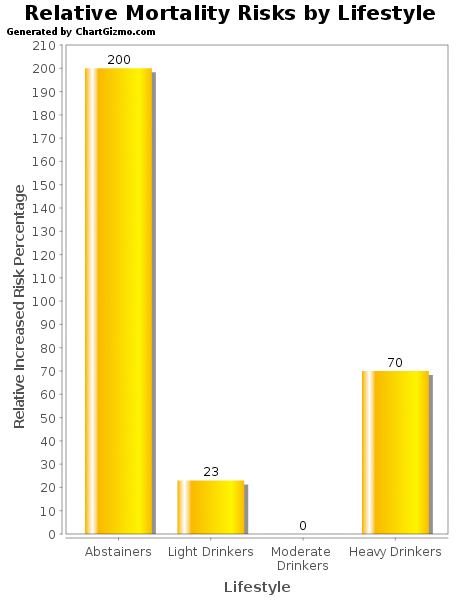![]()
Many different studies have shown that people who drink alcohol in moderation liver longer than binge drinkers and abstainers. Anti-alcohol groups, and especially AA, have petulantly insisted the reason that abstainers show up in the data as having shorter lifespans than moderate drinkers is because they are all former heavy drinkers who stopped drinking after the damage was done. A new study finally puts that self-serving lie to rest.
Late-Life Alcohol Consumption and 20-Year Mortality was recently published in the journal Alcoholism: Clinical and Experimental Research. The study examined “the association between alcohol consumption and all-cause mortality over 20 years among 1,824 older adults, controlling for a wide range of potential confounding factors associated with abstention.” The results, according to the abstract were the following;
Controlling only for age and gender, compared to moderate drinkers, abstainers had a more than 2 times increased mortality risk, heavy drinkers had 70% increased risk, and light drinkers had 23% increased risk. A model controlling for former problem drinking status, existing health problems, and key sociodemographic and social-behavioral factors, as well as for age and gender, substantially reduced the mortality effect for abstainers compared to moderate drinkers. However, even after adjusting for all covariates, abstainers and heavy drinkers continued to show increased mortality risks of 51 and 45%, respectively, compared to moderate drinkers.
And here it is again in a handy chart I made:

See, drinking is good for you. It is part of a healthy lifestyle. Drinking moderately is the best choice you can make to lead a healthier life. It’s better for you than drinking only occasionally, drinking heavily or not at all.
Here’s how Time Magazine put it.
But even after controlling for nearly all imaginable variables — socioeconomic status, level of physical activity, number of close friends, quality of social support and so on — the researchers (a six-member team led by psychologist Charles Holahan of the University of Texas at Austin) found that over a 20-year period, mortality rates were highest for those who had never been drinkers, second-highest for heavy drinkers and lowest for moderate drinkers.
They conclude:
These are remarkable statistics. Even though heavy drinking is associated with higher risk for cirrhosis and several types of cancer (particularly cancers in the mouth and esophagus), heavy drinkers are less likely to die than people who have never drunk. One important reason is that alcohol lubricates so many social interactions, and social interactions are vital for maintaining mental and physical health. As I pointed out last year, nondrinkers show greater signs of depression than those who allow themselves to join the party.
That said, the new study provides the strongest evidence yet that moderate drinking is not only fun but good for you. So make mine a double.
Of course, the researchers bend over backwards to make sure no one thinks they might be advocating for drinking. Heaven forbid. That’s been pretty much SOP for academic papers that have findings at odds with the anti-alcohol community for as long as I can remember. If they discovered tomorrow that chocolate cured cancer, do you think there would be warnings about the dangers of obesity attached to it? My point is everything has consequences but it seems that alcohol continues to carry a stigma that most others do not.
Still, this is great news.

AMEN! I could overrun you w/examples of living family, friends, &/or acquaintances age 80+ (& a few now dead who lived past 80) who drank alcohol most of their adulthood (& likely well before turning 21). Is there enough duct tape available to silence the neo-prohbes?
So, what about the feature on ABC News tonight (9-1-10) with Diane Sawyer tonight saying that drinking causes cancer via the basic metaboling path—worse in women?
I didn’t see that one, but the mortality study didn’t show a difference for gender as far I know. There have been other studies that have shown certain cancer risks for women who drink alcohol (I forget if that was moderate or heavy female drinkers). There are individual diseases that put women (and men) at greater risk depending on their level of alcohol consumption, so obviously individuals with a genetic predisposition for those should take that into account. The meta-studies and those looking at total mortality I believe look at all risk and overall show the results as shown, with the other factors accounted for. As a result, they are in no way invalidated by individual studies like the one you reference.